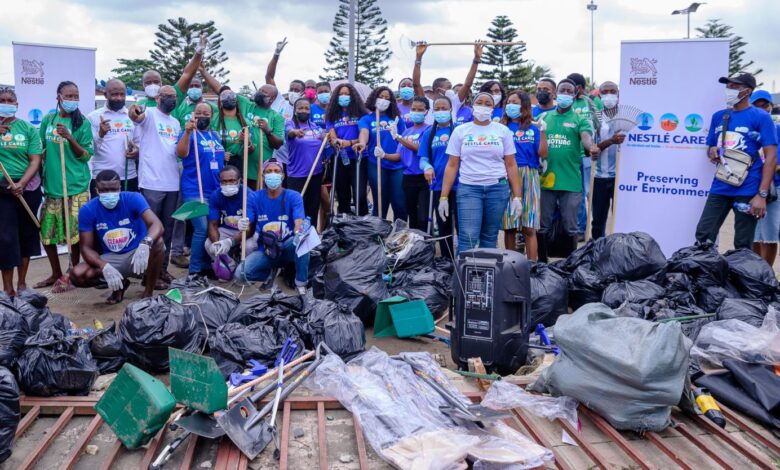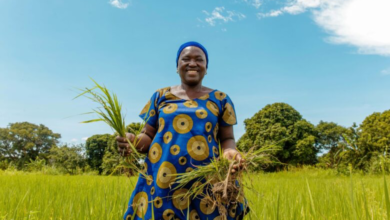Promoting Environmental Sustainability Through Deliberate Actions

Nestle volunteers with heaps of waste recovered from Arena Market during the World Clean Up Day
The Nigerian environment is faced with many problems arising from the impacts of human activities and natural phenomena, therefore there is a need for deliberate actions by all and sundry to address the situation to protect and preserve the environment for future generations, Writes EDET UDOH.
Causes of Environmental Problems
Findings have shown that the environmental problems affecting the Nigerian environment include Sheet erosion; Gully erosion; Coastal and Marine erosion and land subsidence which occur particularly in the coastal areas; Flooding occurs throughout Nigeria in three main forms: coastal flooding, River flooding and Urban flooding; Drought and Desertification; Oil Pollution from spills, oil well blow-outs, oil ballast discharges and improper disposal of drilling mud from petroleum prospecting have resulted in problems such as: the loss of the aesthetic values of natural beaches due to unsightly oil slicks; damage to marine wildlife, modification of the ecosystem through species elimination and the delay in biota (fauna and flora) succession; and decrease in fishery resources.
Other environmental problems are Urban Decay and Squatter Settlements; Industrial Pollution and Waste including Municipal Solid Waste and the various non-biodegradable household petrochemical products such as polythene bags, plastic containers, Styrofoam packages and tyres which litter Nigerian cities; and about 80 million litres of crankcase oil disposed from mechanic workshops; industries, power stations and commercial houses discharged carelessly into drains and ground surfaces in the cities; Concrete Jungles/cities and Climatic Change/Ozone Layer Depletion.
Nigeria also has had to contend with global environmental issues such as climatic change or global warming which is due to the increasing concentrations of atmospheric warming or greenhouse gases (GHG), especially carbon dioxide (CO2) whose concentrations have increased from 280 parts per million (PPM) in the 1800s to about 380 parts per million (PPM) now.
Need For Environmental Stewardship
Speaking on the topic “Environmental Stewardship: Exploring the impact of Plastic Pollution,” during one of the trainings organised by Nestle Nigeria for journalists, Dr. Eugene Itua, called for Environmental Stewardship even as he emphasized the need for proper plastic waste disposal and waste management, saying the menace of plastic pollution globally is overwhelmingly affecting the environment.
“Plastic is an incredibly useful material but made from toxic compounds known to cause harm to the environment and human health. Plastic pollution is the accumulation of plastic objects and particles in the earth’s environment that causes great complexities for all species on the planet.
“Plastic pollution occurs when plastics gather in an area and begin to negatively impact the natural environment, creating problems for plants, wildlife and humans,’’ Itua added.
While giving statistics on the menace of plastic and its effects on the environment, he stated that annually eight million tonnes of plastic waste find its way into the oceans from coastal nations, making it the equivalent of setting five garbage bags full of trash on every foot of coastline around the world, while outlining the consequences of plastic pollution prevalence on the environment and especially, on human health.
He referred to the research carried out by the World Health Organisation (WHO) in 2018 that the presence of microplastics in 50 per cent of bottled water, adding that the test revealed that only 17 bottles were free of plastic out of 259 examined.
Itua said, “The average human consumes about 70,000 microplastics annually and plastic pollution has doubled over the past 50 years. Since 1950s around 8.3 billion tons of plastics have been produced worldwide, and a million plastic bottles are bought globally every minute.
“Plastic production has increased exponentially from 2.3 million tonnes in 1950 to 448 million tonnes by 2015, with production expected to double by 2050. It takes plastic about 400 to 600 years to decompose hence the importance in curbing global plastic pollution.”
Guiding Principles For Environmental Stewardship
Explaining the examples of guiding principles for environmental stewardship and sustainability, Itua emphasized the need for compliance with environmental requirements; building a healthy environment; ensuring environmentally responsible facilities are used for operations; pollution prevention; minimising hazardous waste and use of toxic materials; adoption of green technology; conservation of energy, water and other resources as well as raise the bar of environmental education and awareness.
Effects of Plastic Pollution
He highlighted the adverse effects of plastic pollution while rating Nigeria as number two in plastic imports in Africa.
“Exposure to plastic pollution can result in a variety of adverse effects on human health. It can cause choking in toddlers and severe health outcomes like cancers, birth defects and impaired immunity.
“There have been links between plastic pollution and the growing health problems in today’s generation.
“Frequent complications such as human cardiovascular diseases, respiratory disorders, cancer, diabetes, chronic inflammation and other immune diseases are also attributed to plastic pollution,’’ Itua stated.
Nigeria, according to Itua, is one of the largest consumers of plastics in Africa, with its plastic production increasing every year – Between 1996 and 2021, about 40 million tonnes of primary plastics and products were imported into the country, making Nigeria the second-largest importer of plastic in Africa which accounts for 22 per cent of total plastic consumption in the continent which, he said, is why it has become pertinent to end single-use plastic, encourage sorting and recycling activities, as well as educate people on the dangers of plastic pollution.
Itua called on Nigerians to conserve wildlife (biodiversity), maintain and enhance the quality and character of the landscape as well as protect the historic environment.
Exposure To Climate Change
According to the University of Notre Dame, Global Adaptation Index (GAIN) 2017, on climate change, Nigeria is adjudged the most vulnerable country followed by Ghana, and Liberia while South Africa is the least vulnerable country in Africa.
Out of the 181 countries surveyed, Nigeria is considered 58th most vulnerable and the 22nd least ready country to adapt.
Vulnerabilities include exposure, sensitivity and adaptive capacity – Exposure is the degree to which people and the things they value could be exposed to climate variation or change; sensitivity is the degree to which that exposure could harm them and adaptive capacity is the degree to which they could mitigate the potential for harm by taking action to reduce exposure of sensitivity.
The climate change vulnerability assessments consider the exposure level, sensitivity, potential impact, and adaptive capacity.
Nestle Nigeria’s Action Against Climate Change
It is based on ensuring that collective action is taken on the issue of climate change, that Nestle Nigeria, the Good Food, Good Life Company, has taken it upon itself to deepen awareness of climate change and climate change-related issues in a bid to help in tackling Nigeria’s vulnerability to climate change challenges.
Every year, apart from participating in World Environmental Day where the company invites volunteers including journalists covering, Health/Nutrition, Agriculture, Environment, Business & Economy to join its staff in the programme across the country, the company assembles professionals from Agriculture, Environment, Business, Health/Nutrition, Economy to speak and brainstorm on the need to preserve the environment, ensure economic growth, promote thriving agriculture, and ensure the prosperity of the people amongst other issues aimed at assuaging and mitigating the impact and effect of the menace.
The company also ensures the donation of waste disposal materials to schools and trains those the company called ‘Sustainability Champions’ who will ensure effective and proper waste management in the school and become catalysts for environmental sustainability.
To ensure food security for the ever-growing Nigerian population, the company is fully in support of the regenerative agriculture initiative.
In a bid to tackle the above-mentioned environmental problems faced by Nigeria, Nestle Nigeria has continued to demonstrate a strong commitment to helping in the protection, renewal, and restoration of the environment through its various initiatives aimed at promoting environmental sustainability and ensuring adoption of global principles on climate change otherwise known as Paris Agreement which aim at strengthening the global response to the threat of climate change by keeping the global temperature rise well below 2 degrees Celsius above pre-industrial levels, or even below 1.5 degrees Celsius.
Interestingly, in a bid to actualise its vision of a waste-free future as well as ensure environmental sustainability, has taken necessary actions to promote behavioural changes, and to build a circular ecosystem in waste management, starting from the company’s employees and extending to the communities closest to its operations and to a wider audience across Nigeria.
In 2022, Nestlé Nigeria launched her employee plastics collection scheme which inspires staff to protect the environment and combat plastic pollution by inculcating the habit of sorting wastes at source and recycling for sustainable environmental management.
Through the scheme, employees return all plastic materials, not limited to the company’s brands, and earn points culminating in exciting rewards and management recognitions.
Partnership/Awareness On Environmental Sustainability
Over the years, the company has partnered with the Lagos Business School Sustainability Centre on the “Advancing Nutrition, Health and Environmental Awareness through the Media” training which equips journalists to effectively communicate and educate the Nigerian populace on global best practices and lifestyle choices that impact everyday living and carry out fact-based reporting on nutrition, health, wellness, the environment, climate change, and corporate sustainability practices.
Nestlé has also extended her education campaign to the younger generations through the Sustainability Training for Kids which enables children to imbibe a sustainability mindset from an early age, thereby preparing them to become better stewards of the planet.
The training implemented in collaboration with the International Climate Change Development Initiative (ICCDI), furnishes children with information on waste management, introduces them to the conversion of waste to useful items, and encourages them to adopt positive behavioural changes to enhance environmental sustainability.
The children are also taught sorting of waste at the source with the donation of segregated bins to participating schools.
In Nigeria where we have a nascent waste collection system, poorly managed waste ends up in waterways and clogs drainages, exacerbating the environmental hazards, including flooding which we are increasingly experiencing due to the effects of climate change.
Addressing the Plastic Waste Challenge
Data shows that Nigeria generates more than 32 million tons of waste per year with Lagos alone producing about 10,000 metric tons of waste daily. Addressing the plastic waste challenge requires behaviour change from all and Nestlé believes that there is no better place to start than from within.
Nestlé Nigeria is therefore collaborating internally and with external stakeholders to address the waste challenge in line with the company’s global vision that none of its post-consumer packaging waste ends up in waterways or as litter in the environment.
The World Clean-Up Day commemorated annually in September, provides a platform for Nestlé’s employees to help promote awareness of environmentally sound waste management practices for a clean, safe and sustainable planet. Every year, volunteers under Nestlé Cares, the company’s global employee volunteering initiative, collaborate with the Africa Clean-Up Initiative (ACI), an NGO passionate about raising environmentally responsible citizens, for clean-up, sensitization and advocacy on Environmental Sustainability.
In a practical demonstration of its commitment to protecting the environment, in 2023, in commemoration of World Clean Up Day, over 400 Nestlé employees joined the campaign by visiting twelve markets across the country.
The clean-up exercise took place in Lagos, Kano, Port Harcourt, Sagamu, Ibadan, Jos, Abuja, Awka, Ota, Agbara, Enugu and Abaji, was powered by MAGGI, one of Nestlé’s leading brands.
Speaking at the occasion, Nestlé Nigeria’s Corporate Communications and Public Affairs Manager, Victoria Uwadoka said, “At Nestlé, we are taking concrete actions to protect, renew and restore the environment every day. We are conscious that indiscriminate waste disposals coupled with limited recovery services aggravate the waste crisis. We also recognize that creating awareness through advocacy is necessary on our journey toward a waste-free future.
“Our priorities, therefore, include improving post-consumption plastic waste management by motivating behavioural changes and creating an efficient recovery system in collaboration with other industry and community stakeholders. We are also accelerating sustainability education through our employees, the media, our communities and children in our Nestlé for Healthier Kids beneficiary schools. The market clean-up exercises are one of the ways we have sustained our efforts of improving our environment over the past five years.”
According to Dr Alexander Akhigbe, Founder/CEO of African Clean-Up Initiative, “Participating in clean-up exercises is a great way to get involved and make a difference in keeping our environment clean and healthy for everyone. At African Clean-Up Initiative, we are passionate about raising environmentally responsible citizens and communities, working for the highest good of the Planet. For this year’s exercise, we ensured the proper management of over 6,660kg of solid waste and 79kg of recyclables collected across all the locations, so that they do not end up back in the environment. We are honoured to be working with Nestlé Nigeria as her implementing partners for this year’s event”.
Comrade Aremu Komolafe, member of the Ojuwoye market committee in Mushin, Lagos State expressed his pleasure with volunteers from Nestlé Nigeria who joined the traders and market leaders to clean up the popular market in South-West Nigeria.
According to him, with the significant amount of waste generated daily due to the large number of visitors and traders buying and selling, the burden of keeping the market clean is huge. To mitigate the situation, every Thursday is designated by the Lagos State government for market clean-up and sensitization of shop and stall owners on the need for proper waste disposal. He said that the cleanup initiative by Nestlé Nigeria will support these environmental sanitation efforts.
Nestlé Nigeria is a leading member of the Food and Beverage Recycling Alliance (FBRA), an Industry collaboration aimed at driving post-consumption waste management and recycling. Volunteers from the company also joined the FBRA-led clean-up initiatives for World Clean-Up Day.
Through the Nestlé Cares platform, employees have the opportunity to give back to society, impacting individuals and families, communities and the environment, by volunteering their time, resources and talents.
The company says it will continue to play its part to ensure a cleaner and healthier environment across its operating locations, helping to create a more sustainable world.
To eradicate the plastic pollution challenge, and protect the environment, experts have advocated for shopping with reusable bags; drinking water with a reusable water bottle;, supporting recycling –sorting no disposable plastics; adopting better choices at home; avoiding cosmetics and personal hygiene products having microbeads, the little dots in your toothpaste, and facial scrubs, which are a type of microplastic; educate businesses and charged all stakeholders including the media to get involved.
A call for Collective and Deliberate Action against Climate Change
Responding to climate threats requires collective action. Experts opined that the government must provide leadership by creating and championing a framework with clear goals, roles and responsibilities including amongst others, platforms for engagement with key stakeholders required to achieve climate readiness, improve decision-making, develop strategies and ensure implementation.
Speaking on the topic: ”Climate Change, Nutrition and Food Security – Exploring The Linkages,” at Nestle’s “Advancing Nutrition and Environmental Awareness Through The Media,”a special media training organized by Nestle Nigeria in partnership with the Lagos Business School Sustainability Centre, Mr. Amara Nwankpa, Director, Public Policy Initiatives at Shehu Musa Yar’Adua Foundation, called for climate readiness action that includes improving governance and stakeholder engagement; provision of information and accounting systems; establishment of knowledge and information services, and development of climate-smart agricultural strategy and implementation framework that builds community-level capabilities.
On governance and stakeholder engagement, he said a lead ministry or inter-ministerial body should be designated to manage and coordinate climate readiness activities with clear decision-making processes and transparency. Make sure institutional roles are clearly defined by creating and sustaining platforms for stakeholder engagement and consultation, including the private sector, adding that they should ensure the inclusion of affected and vulnerable groups, such as smallholders, indigenous communities, and women.
He said there should be knowledge-based information services that assess the vulnerability and adaptation needs of farmers and the agricultural sector; classify agricultural production systems according to adaptation needs and mitigation opportunities as well as identify options and priorities for climate-smart agriculture, including the reduction of agriculture greenhouse gas emissions.
He said there is a need to make climate information services available and accessible to farmers and other agricultural decision-makers; analyse and reform current land use practices and legislation to support climate-smart agriculture and ensure social and environmental impacts of climate-smart agriculture programmes are anticipated before they are scaled up, particularly for
“Formulate a vision and goals for the agricultural sector that ensures buy-in from stakeholder groups. Balance food security, adaptation and mitigation and the need to meet United Nations Sustainable Development Goals.
“Ensure climate-smart agriculture interventions are analysed for social and biophysical suitability. Identify and pursue priority interventions that reduce vulnerability. Ensure projects are viable and sustainable. Make provisions for programme monitoring and improvement
“Make credit available to rural farmers who implement climate-smart practices. Establish and improve access to seed banks with high-yield seeds.
“Provide effective technical support and agricultural extension service. Galvanize private sector and rural farmer organizations, including women and youth, to support innovation, learning and implementation of climate-smart agriculture practices.
“Establish criteria and measurable indicators for resilience, climate change mitigation and food security. Create monitoring systems for climate threats and vulnerability assessments. Develop a national system to measure, monitor, report, and verify GHG emissions and multiple-benefit indicators in coordination with other monitoring activities,” Mr. Nwankpa stated.
In Conclusion, while we continue to explore the environment for our economic prosperity, there is a need also for all including individuals, governments at all levels and corporate institutions to ensure that the environment is preserved and protected for future generations through deliberate actions.





